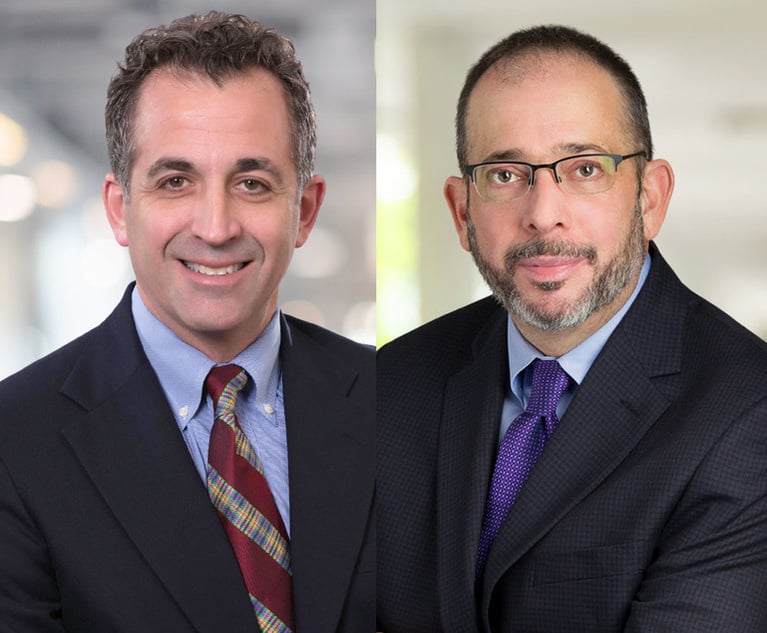This 150-Lawyer Atlanta Firm Is Now Opening … Everywhere
Marc Taylor, who founded 150-lawyer Taylor English Duma in Atlanta 12 years ago, has a vision for the future. Just a couple decades from now, he…
July 13, 2017 at 02:27 PM
5 minute read
Marc Taylor, who founded 150-lawyer Taylor English Duma in Atlanta 12 years ago, has a vision for the future. Just a couple decades from now, he sees the Am Law 200 reduced to a “Global 30.” Thousands of diligent, hardworking Big Law partners are left wondering where to ply their skills in this dystopian legal market.
The vision may be bleak, but Taylor is marketing a solution for it: a virtual branch.
Taylor English, which now works out of 90,000 square feet in a suburban office park, has plans to hire partners all across the country. They will work from home and plug into the firm's existing “hub” in Atlanta.
To Taylor, the “hybrid model” is a way to provide more support than currently offered by today's virtual firms, such as FisherBroyles or Culhane Meadows.
To launch the effort, Taylor English in March hired Chris Wilson, who had been the Atlanta managing partner for FisherBroyles. With about 180 partners, FisherBroyles is the largest of a growing handful of virtual firms. According to co-founder Kevin Broyles, it expects to crack the Am Law 200 next year as its revenue has recently grown 50 percent year-over-year.
Other virtual or cloud-based firms include Potomac Law Group, Rimon Law and VLP Law Group, which have seen year-over-year revenue growth between 40 and 60 percent for the past half-decade.
|Virtual Lawyering for Real Pay
Taylor English's remote lawyers, as the firm refers to them, will have a compensation system similar to other virtual firms. They will keep 80 percent of the revenue they originate and handle. Originating lawyers who pass on work to other attorneys will split that portion. That is the same percentage as at Culhane Meadows, a branch-off from FisherBroyles that opened in 2013 and now has about 60 lawyers.
But, in addition to having access to a ready-made 150-lawyer law firm, there are other differences in Taylor English's approach to the virtual firm market. For instance, the remote partners will have the option to become equity partners in the Atlanta hub. Most virtual firm partners have no equity.
“Our remote partners are just that. They are partners,” Taylor said. “If they want to become an equity partner in our normal brick and mortar equity partnership structure, we welcome them.”
Perhaps the main reason Taylor English is able to expand in this way is that its compensation system has always been a version of the virtual eat-what-you-kill style. Partners—and associates for that matter—keep a percentage of every dollar they bring in the door. Due to the expense associated with a physical office, the percentage those partners keep is lower than what virtual firms offer, but Taylor English declined to provide a specific percentage.
“The model syncs in effortlessly with the model we already run,” Taylor said.
The firm plans to add its first virtual partner on Monday and a second on Aug. 1. Both are Atlanta-based lawyers who currently work remotely, Taylor said.
Taylor English also plans to offer other services that are not typically provided in virtual firms, including computers, software, marketing support and IT support. Many virtual firms require lawyers to buy their own computers and use their own money for marketing efforts.
While Taylor English may stand out as a brick-and-mortar shop branching into the virtual world, one firm has gone the other way. Rimon Law, founded in Silicon Valley by two former Ropes & Gray lawyers, has grown from its initial virtual model to open offices in a number of cities.
All virtual firms mainly recruit partners from Am Law 200 firms who have their own book of business. Taylor English said it is looking for partners with an average of $500,000 in business.
Taylor said having a traditional office in Atlanta will ease the transition to a stay-at-home practice for lawyers used to a typical law firm environment.
“We're providing more resources to the attorneys to assist them in doing their job better,” Wilson said.
As for why the future of Big Law looks so bleak to Taylor, he believes more traditional practices will face the kinds of pricing pressures that have reshaped labor and employment work. As that price pressure increases, partners will increasingly find themselves at odds with management that seeks to bolster profits. Consolidation will continue at a faster pace.
The virtual model is an arbitrage play. By reducing overhead costs, partners can drastically lower their rates. Once Taylor came to that conclusion, he said he spent about a year convincing Taylor English's partnership that a virtual branch was in their long-term interest.
“We need to be there first,” Taylor said. “We need to be there aggressively, and we need to have an opportunity to own this space and make the market what it can be.”
Roy Strom, based in Chicago, covers the business of law with a focus on how law firm business models are changing. He can be reached at [email protected]. On Twitter: @RoyWStrom.
This content has been archived. It is available through our partners, LexisNexis® and Bloomberg Law.
To view this content, please continue to their sites.
Not a Lexis Subscriber?
Subscribe Now
Not a Bloomberg Law Subscriber?
Subscribe Now
NOT FOR REPRINT
© 2025 ALM Global, LLC, All Rights Reserved. Request academic re-use from www.copyright.com. All other uses, submit a request to [email protected]. For more information visit Asset & Logo Licensing.
You Might Like
View All
Billing Rate Increases Boost Atlanta and Southeast Law Firms' Financial Growth
6 minute read
Bradley Arant Sees Revenues Rise and PEP Fall Amid 12% Equity Partner Expansion
5 minute read
As Associate Pay Raises Divide the Market, Several Law Firms Match, Others Hold Off
5 minute read
Phila.-Based Weber Gallagher Opens Florida Outpost With Fowler White Partner
4 minute readTrending Stories
Who Got The Work
Michael G. Bongiorno, Andrew Scott Dulberg and Elizabeth E. Driscoll from Wilmer Cutler Pickering Hale and Dorr have stepped in to represent Symbotic Inc., an A.I.-enabled technology platform that focuses on increasing supply chain efficiency, and other defendants in a pending shareholder derivative lawsuit. The case, filed Oct. 2 in Massachusetts District Court by the Brown Law Firm on behalf of Stephen Austen, accuses certain officers and directors of misleading investors in regard to Symbotic's potential for margin growth by failing to disclose that the company was not equipped to timely deploy its systems or manage expenses through project delays. The case, assigned to U.S. District Judge Nathaniel M. Gorton, is 1:24-cv-12522, Austen v. Cohen et al.
Who Got The Work
Edmund Polubinski and Marie Killmond of Davis Polk & Wardwell have entered appearances for data platform software development company MongoDB and other defendants in a pending shareholder derivative lawsuit. The action, filed Oct. 7 in New York Southern District Court by the Brown Law Firm, accuses the company's directors and/or officers of falsely expressing confidence in the company’s restructuring of its sales incentive plan and downplaying the severity of decreases in its upfront commitments. The case is 1:24-cv-07594, Roy v. Ittycheria et al.
Who Got The Work
Amy O. Bruchs and Kurt F. Ellison of Michael Best & Friedrich have entered appearances for Epic Systems Corp. in a pending employment discrimination lawsuit. The suit was filed Sept. 7 in Wisconsin Western District Court by Levine Eisberner LLC and Siri & Glimstad on behalf of a project manager who claims that he was wrongfully terminated after applying for a religious exemption to the defendant's COVID-19 vaccine mandate. The case, assigned to U.S. Magistrate Judge Anita Marie Boor, is 3:24-cv-00630, Secker, Nathan v. Epic Systems Corporation.
Who Got The Work
David X. Sullivan, Thomas J. Finn and Gregory A. Hall from McCarter & English have entered appearances for Sunrun Installation Services in a pending civil rights lawsuit. The complaint was filed Sept. 4 in Connecticut District Court by attorney Robert M. Berke on behalf of former employee George Edward Steins, who was arrested and charged with employing an unregistered home improvement salesperson. The complaint alleges that had Sunrun informed the Connecticut Department of Consumer Protection that the plaintiff's employment had ended in 2017 and that he no longer held Sunrun's home improvement contractor license, he would not have been hit with charges, which were dismissed in May 2024. The case, assigned to U.S. District Judge Jeffrey A. Meyer, is 3:24-cv-01423, Steins v. Sunrun, Inc. et al.
Who Got The Work
Greenberg Traurig shareholder Joshua L. Raskin has entered an appearance for boohoo.com UK Ltd. in a pending patent infringement lawsuit. The suit, filed Sept. 3 in Texas Eastern District Court by Rozier Hardt McDonough on behalf of Alto Dynamics, asserts five patents related to an online shopping platform. The case, assigned to U.S. District Judge Rodney Gilstrap, is 2:24-cv-00719, Alto Dynamics, LLC v. boohoo.com UK Limited.
Featured Firms
Law Offices of Gary Martin Hays & Associates, P.C.
(470) 294-1674
Law Offices of Mark E. Salomone
(857) 444-6468
Smith & Hassler
(713) 739-1250







